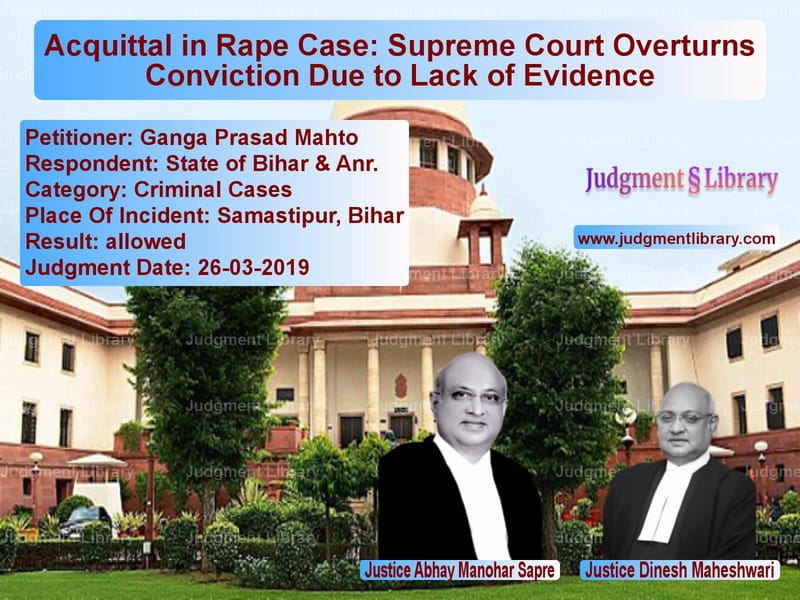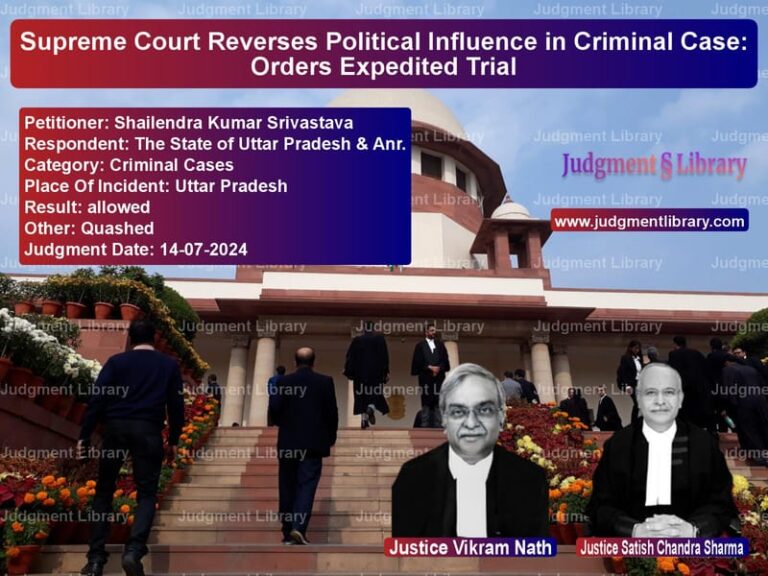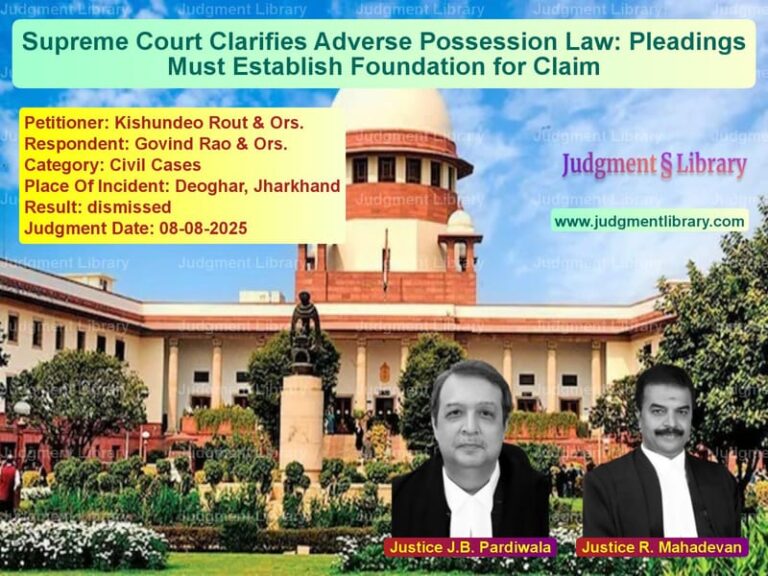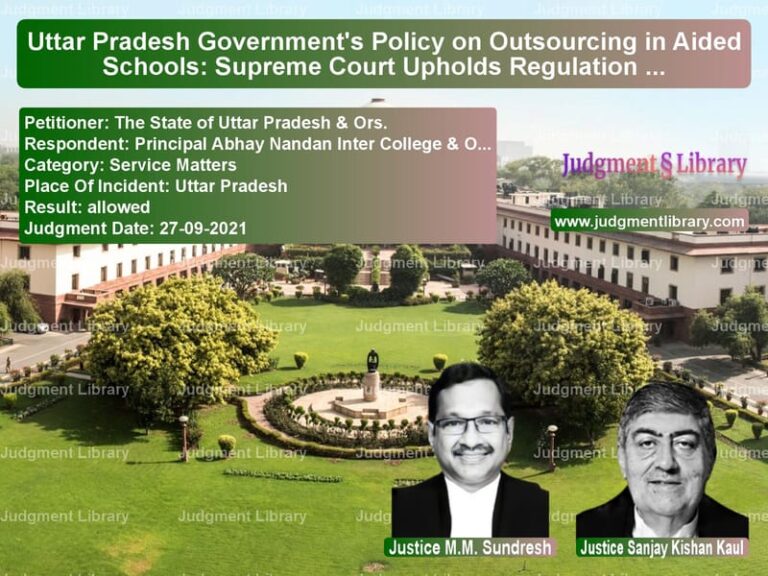Acquittal in Rape Case: Supreme Court Overturns Conviction Due to Lack of Evidence
The case of Ganga Prasad Mahto vs. State of Bihar & Anr. is a crucial legal judgment where the Supreme Court overturned the conviction of an accused under Section 376 of the Indian Penal Code (IPC). The case was originally heard in the Sessions Court, where the appellant was convicted for rape and sentenced to seven years of rigorous imprisonment. The conviction was subsequently upheld by the Patna High Court. However, upon further appeal, the Supreme Court found inconsistencies and lack of evidence, leading to an acquittal.
Background of the Case
The appellant, Ganga Prasad Mahto, was accused of committing rape against the prosecutrix (PW-3) on the night of December 14, 1997. According to the complaint, he allegedly entered her house at 8:00 PM, threatened her with a pistol, and committed the offense. The complaint was lodged the following day, on December 15, 1997.
The case proceeded to trial, where the prosecution presented three witnesses:
- PW-1: Husband of the complainant
- PW-2: A neighbor who claimed to have knowledge of the incident
- PW-3: The complainant (prosecutrix) herself
Despite the prosecution’s evidence, the Supreme Court found several inconsistencies in the case, leading to its decision to overturn the conviction.
Arguments by the Petitioner (Appellant – Ganga Prasad Mahto)
- The appellant argued that the prosecution failed to establish his guilt beyond a reasonable doubt.
- There was no medical examination of the complainant, which is crucial in a case of this nature.
- The complainant had made similar allegations against multiple individuals in the past, which were found to be false.
- The prosecution’s key witness (PW-2) was a “chance witness” and could not be relied upon.
- The appellant had a history of enmity with the complainant’s husband, which suggested the possibility of a false implication.
Arguments by the Respondent (State of Bihar)
- The prosecution contended that the complainant’s testimony was sufficient to establish the offense.
- They argued that minor inconsistencies in evidence should not overshadow the broader facts of the case.
- They maintained that the Sessions Court and High Court had rightly convicted the appellant.
Supreme Court’s Analysis and Key Findings
The Supreme Court, while reviewing the case, noted several crucial shortcomings in the prosecution’s case:
- “First, the complainant was not examined by the doctor after the alleged incident.”
- “Second, in absence of any medical examination done, the prosecution did not examine any doctor in the trial in support of their case.”
- “Third, it was not disputed that similar type of complaints were being made in the past by the complainant against other persons also and such complaints were later found false.”
- “Fourth, it was also not disputed that there was enmity between the appellant and the husband of the prosecutrix, due to which their relations were not cordial.”
- “Fifth, it had also come in evidence that the prosecutrix was in habit of implicating all the persons by making wild allegations of such nature against those with whom she or/and her husband were having any kind of disputes.”
- “Sixth, there was no eyewitness to the alleged incident and the one, who was cited as a witness, i.e., PW-2 was a chance witness on whose testimony, a charge of rape could not be established.”
- “Lastly, so far as PW-1, husband of the complainant, is concerned, he admitted that he was away and returned to the village the next day morning of the incident.”
Given these findings, the Supreme Court determined that the prosecution had failed to establish the appellant’s guilt beyond a reasonable doubt.
Supreme Court’s Judgment
After considering the inconsistencies in the prosecution’s case, the Supreme Court ruled:
- “In the light of the aforementioned seven reasons, we are of the considered opinion that the prosecution has failed to prove the case of rape alleged by the Complainant (PW-3) against the appellant beyond reasonable doubt.”
- “There is no evidence adduced by the prosecution to prove the commission of the offense of rape by the appellant on PW-3 and the evidence adduced is not sufficient to prove the case of rape against the appellant.”
- “Both the Courts below were, therefore, not justified in convicting the appellant for an offense punishable under Section 376 IPC and sentencing him to undergo rigorous imprisonment for seven years. He was entitled for acquittal.”
Conclusion
The Supreme Court’s ruling in Ganga Prasad Mahto vs. State of Bihar & Anr. reaffirms the principle that conviction in criminal cases must be based on clear, reliable, and corroborative evidence. The Court emphasized the importance of medical examination, eyewitness testimony, and credibility of the complainant’s past conduct.
This judgment serves as a reminder that courts must exercise extreme caution in cases where allegations lack supporting evidence, ensuring that justice prevails based on facts rather than mere accusations.
The appeal was thus allowed, and the appellant was acquitted.
Petitioner Name: Ganga Prasad Mahto.Respondent Name: State of Bihar & Anr..Judgment By: Justice Abhay Manohar Sapre, Justice Dinesh Maheshwari.Place Of Incident: Samastipur, Bihar.Judgment Date: 26-03-2019.
Don’t miss out on the full details! Download the complete judgment in PDF format below and gain valuable insights instantly!
Download Judgment: Ganga Prasad Mahto vs State of Bihar & Anr Supreme Court of India Judgment Dated 26-03-2019.pdf
Direct Downlaod Judgment: Direct downlaod this Judgment
See all petitions in Bail and Anticipatory Bail
See all petitions in Custodial Deaths and Police Misconduct
See all petitions in Fraud and Forgery
See all petitions in Judgment by Abhay Manohar Sapre
See all petitions in Judgment by Dinesh Maheshwari
See all petitions in allowed
See all petitions in supreme court of India judgments March 2019
See all petitions in 2019 judgments
See all posts in Criminal Cases Category
See all allowed petitions in Criminal Cases Category
See all Dismissed petitions in Criminal Cases Category
See all partially allowed petitions in Criminal Cases Category







